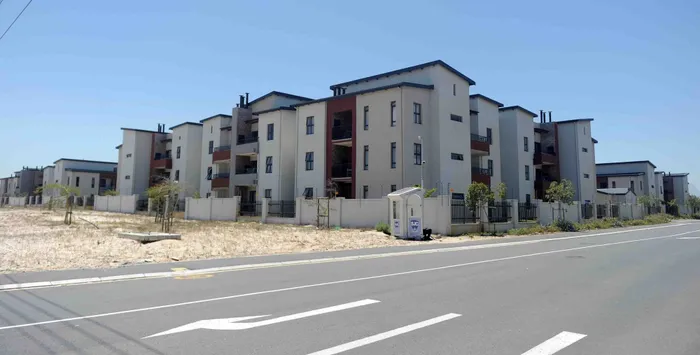Sectional title properties outperform freehold homes in SA's booming market

In July, sectional title properties, for the first time since the pandemic, slightly surpassed the equity values of freestanding homes.
Image: Picture: Ayanda Ndamane/African News Agency (ANA)
Going forward, sectional title living is set to remain one of the strongest-performing segments of South Africa’s residential property market.
This was due to affordability pressures, urban densification and lifestyle changes all shaping buyer behaviour, says Bradd Bendall, the national head of sales at BetterBond.
“The market dynamics suggest that sectional title properties will continue to attract both end-users and investors who value accessibility, security and the convenience of modern urban living.”
Sectional title sales across South Africa have shown significant growth in recent months as they outpaced freehold home sales in many urban areas.
“Affordability and lifestyle changes favouring lock-up-and-go convenience are among the drivers of this trend,” says Bendall. “Younger and first-time buyers in particular are drawn to sectional title properties because they are more accessible, require less maintenance and often offer desirable communal amenities.”
According to the FNB House Price Index, July marked a key milestone: for the first time post-pandemic, equity values generated by sectional title properties marginally outpaced those of freestanding homes.
The cycle of interest rate increases between 2021 and 2023 was said to have played a major role in this shift, as buyers sought more “compact, cost-effective housing options.”
Sectional title buyers
Since they offered affordability, security and convenience, sectional title properties continue to attract a diverse range of buyers.
“Women, who account for 69% of all homeownership solely or jointly with men, according to Lightstone, are significant drivers of this sector of the market,” says Bendall.
For younger buyers entering the property market, sectional title developments offer an accessible entry point. Buying off-plan in a new development exempts these buyers from paying transfer duty costs.
The lock-up-and-go lifestyle also appeals to professionals who travel frequently or commute between provinces for work, he adds.
BetterBond says Gauteng, which offers economic opportunities that particularly appeal to younger buyers, dominates the sectional title market. The Western Cape and KwaZulu-Natal also appeal to buyers of sectional title properties.
Coastal areas such as Durban and Umhlanga have become sectional title hot spots in this province. According to REMAX, demand is particularly strong along the North Coast, where secure, low-maintenance estates are redefining modern living.
The real estate agency says homebuyers in the province are changing the way they live and invest - driving a noticeable surge in sectional title purchases across KZN.
With R127 billion worth of investment flowing into Gqeberha in the Eastern Cape, as announced at the Eastern Cape Investment Conference in 2023, the influx of young professionals and families to the city has seen renewed demand for sectional title properties, Bendall adds.
The bond originator says, despite the positive change in the prime lending rate since last year, the sectional title market shows no sign of losing momentum.
Lightstone data shows that in August, sectional title inflation nationally was 4.3%, compared to 4.8% for freehold properties. In 2021, the difference was far greater, with sectional title property prices rising by 6.4% while freehold prices increased by only 3.4%.
Supply vs demand
With the growing demand, developers are said to have been quick to respond to the growing demand for sectional title living. Year-to-date, the supply of new flats and townhouses sold or leased as sectional title properties increased by 13.5%, according to the FNB Index.
However, Bendall cautions that supply must keep pace with demand. “In July, the percentage of building plans approved for properties likely to be used as sectional title units dropped by 21.2%, as reported in the FNB Index.”
Investment opportunities
On the other hand, investors are taking advantage of the growing demand for sectional title living. These properties have shown impressive rental returns, with the TPN Residential Gross Yield for sectional title units reaching 10.79% towards the end of last year.
According to the latest State of Cape Town Central City Report released by the Cape Town Central City Improvement District, in high-demand nodes such as Cape Town’s central business district, demand has translated into robust price growth. Median sectional title property prices in the CBD increased by 16.3% in the past year.
In January, the average price of a sectional title property in the inner city was R1.85 million, while the total value of new residential buildings in the area is estimated at R2.93 billion.
More than half of the residents in Cape Town’s inner city come from outside the metro, thereby underscoring the strong semigration trend driven by lifestyle and work opportunities.
BetterBond says that, still, there are pockets of strong growth across the country.
In Cape Town’s southern suburbs, for example, it says there are 14 new development projects in the pipeline, according to Lew Geffen Sotheby’s International Realty. It says municipal zoning reforms and the growing push toward higher-density urban housing are further fuelling this expansion.
Independent Media Property
Related Topics: